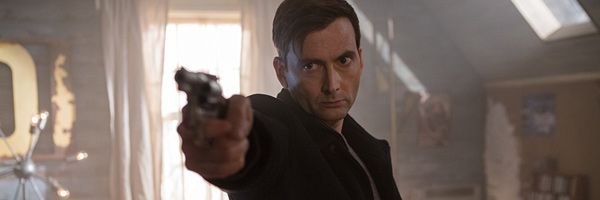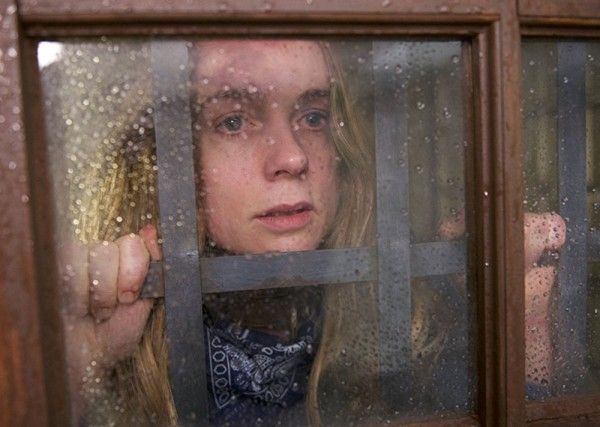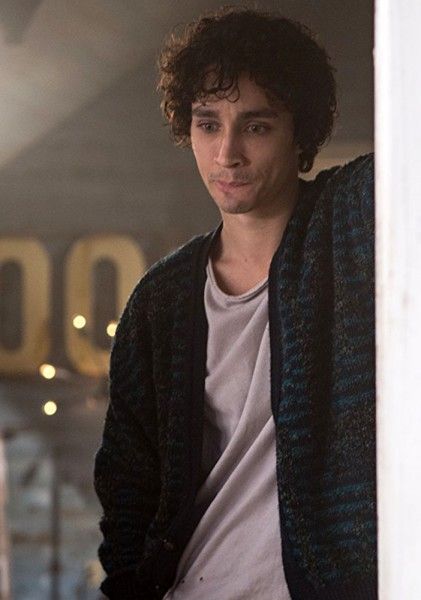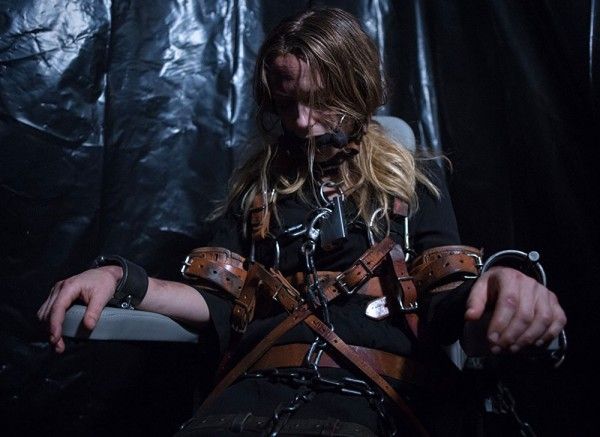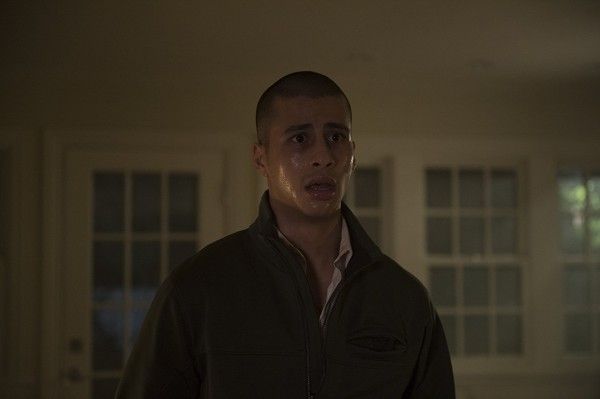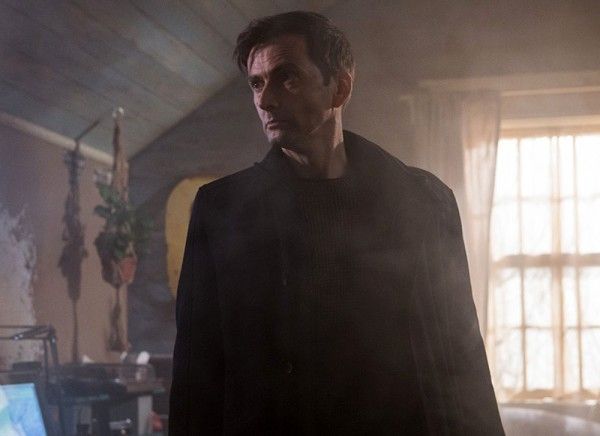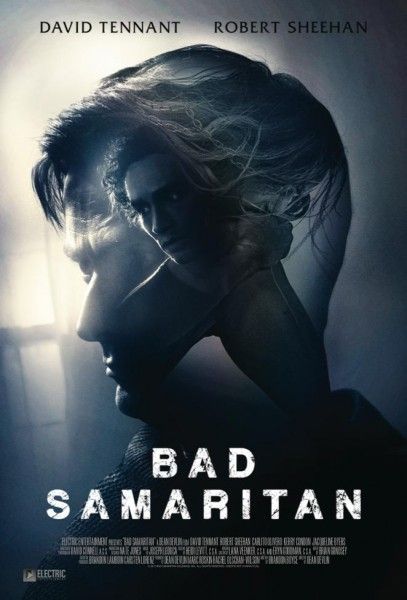From writer Brandon Boyce (Apt Pupil) and director Dean Devlin (Geostorm), the thriller Bad Samaritan follows Sean (Robert Sheehan) who, along with his best friend (Carlito Olivero), is a valet at a local restaurant in Portland, Oregon, where the two men burglarize the houses of customers while they eat. It’s a situation that works for them, until Sean robs the wrong customer – a wealthy man named Cale Erendreich (David Tennant) – and discovers that he’s holding a woman (Kerry Condon) captive and, in order to save her, he must endure the wrath of the kidnapper, who now seeks revenge on him.
At the film’s Los Angeles press day, Collider got the opportunity to sit down with director Dean Devlin to chat 1-on-1 about what made him want to tell this story, what led him to David Tennant and Robert Sheehan for these roles, why he told the cast that he would never ask them to do something that he wouldn’t do myself, how the script changed from the first time he read it, and why his history directing TV worked to his advantage on this production. He also talked about what happened with Independence Day 3 and Stargate, why he doesn’t feel he’s right for the studio system, and which TV series he’d love to direct an episode of.
Collider: It was so much fun to watch these two actors together. You definitely root for some sort of justification at the end, which I think you definitely earn.
DEAN DEVLIN: Yeah, those two were incredible. Look, I think everybody has made mistakes and done things they regret, but how do you respond, after you’ve done it? Do you rationalize your decisions, which is the ultimate act of cowardice, or do you act upon it? That’s what I think is so interesting about the movie. Sean is not the most lovable character. He’s, as one might say, morally flexible.
And could even be the villain in another story.
DEVLIN: That’s right. And when he’s confronted with the most important moral decision of his life, he makes the wrong choice. He immediately knows he did and he’s humiliated by it, and his cowardice is something that he realizes he can’t live with and he’s got to act. I find that to be compelling and interesting.
It’s interesting because you can understand why he made the decision he made because she is a stranger and he’s risking his life for someone he doesn’t know.
DEVLIN: I think it works because of Robert’s performance. There are not a lot of young actors who would check their ego aside. I could see the discussions I would have had with other actors saying, “Why am I such a pussy?” Robert embraced the humanity of it and he allowed himself to really be incredibly cowardly. By allowing himself to be that vulnerable, as an actor, it became a human moment. It became something like, “I hope I never do that, but I could see why I might,” and that makes me want him to redeem himself.
What were the conversations like on set, when you were working with Kerry Condon, especially when she had to be bound and gagged?
DEVLIN: Well, I did say to every actor that I would never ask them to do something that I wouldn’t do myself, so I actually put myself in the chains, just to make sure it wasn’t going to be overly onerous. The thing is, with that character – and I think it’s why Kerry agreed to do the part because we talked about it in pre-production – her way of being pro-active is to create the illusion that she’s becoming docile. Normally, when you’ve got a pro-active captive, they’re trying to escape, and they’re yelling and screaming. This character can’t do that because that would facilitate death. She has to give the illusion that what he’s trying to accomplish is working while she waits for her moment to be pro-active. There’s no dialogue to express that, so you need an actor of such depth that they could do all of that in subtext, behind the eyes, so that the audience can read it. That way, when she does find her moment, we knew that she was waiting for it.
When this came your way, it came to you as a spec script that screenwriter Brandon Boyce was asking for advice on, and then you decided you wanted to do it. What was it that made you so passionate about telling this story?
DEVLIN: Well, the first thing is that it was a page turner. I couldn’t put the script down, and that’s so rare. Usually, I’m not a great reader. I have to push myself to read through a script. And the other problem I have is that, very often, I’m rewriting a script while I’m reading it, and then I get half-way through it and I realize the movie in my head is totally different from the one I’m reading, so I’ve gotta start over again. This one was absolutely compelling, from the first page to the last. I just couldn’t put it down. It also reminded me of early Brian De Palma movies that I fell in love with, like Dressed to Kill, and things like that. There are a lot of great scary movies in the last couple of years, but they tend to be either supernatural or have a science fiction aspect, or creatures, or aliens. To me, the most horrifying and frightening thing in the world are other people. If you had a psychotic person, who had no ability to feel guilt or empathy, and you married that with someone who had all of the resources and money in the world, that’s a very terrifying idea, but not so unrealistic that you couldn’t run into that, in real life. That’s what chilled me.
Did the film change a lot, from that first script that you read, or is it pretty close?
DEVLIN: It’s pretty darn close. I have to say, Brandon really knocked out, with that first draft. The biggest changes were moving it from Los Angeles to Portland, and making Robert’s character Irish because I wanted him to use his organic voice. Then, the only other real change was that we really deepened out David Tennant’s character, through a series of discussions with him in pre-production. One of the lovely things about everybody who worked on this was that they really did their homework. It’s not like people showed up on set and just started trying to figure it out. There was an enormous amount of work done, before we showed up on set. When we got on set, it was just a speed rail. It was fantastic. The script stayed pretty much the same. I’m not a believer of bringing in new writer after new writer after new writer. I know that’s what Hollywood does now, but I loved his script. Whatever changes we did, we did together. He was involved with the entire prep. He was there, every single day of the shoot, and he came into the editing room with me. He was my partner in making the movie. That’s how I started, when I was Roland Emmerich’s writing partner. I like having someone else for checks and balance. Sometimes when I’m directing, I’ll get overly obsessed with the way the camera is picking up the light through a window, and I need someone to tap me on the shoulder and go, “It’s not about the light in the window. It’s about the watch on the table.”
It seems like one of the things that changes most in a movie like this is the ending. Did you make any changes to the ending?
DEVLIN: Not to do spoilers here, but the biggest change was that one of the characters died, originally, and I was having so much fun with these characters that I said, “In success, I might want to see more of that character. I don’t know if I’m ready to lose that character.”
You’ve directed a lot of TV, which I would imagine works to your advantage, in doing a film like this, with a lower budget and quicker schedule.
DEVLIN: Yeah, sure. Definitely!
What do you feel are the biggest differences between the two, and how does one sort of help the other?
DEVLIN: Well, I think every director should be forced to do an hour of television because it’s speed chess. Yes, you can do some stuff in prep, but mostly you’ve gotta make decisions on the fly, especially if you try to do a movie of this ambition in 31 days, during five snow storms. I’m sure my television work helped with that. This is also the crew that I use to do television. These are all the people that I’ve made television with for 10 years. I was surrounded by gifted people who knew me, who I trusted and who trusted me, and that elevated everything. When I started this, I realized this is a cinematic language that I’ve never used before. I had to learn a new language. My D.P. has experience doing Stephen King things, and stuff like that, so he was able to hold my hand and walk me through it. And Brandon is a student of psychotics. He brought all of these books in and kept talking about the line between normal OCD and psychotic OCD. So, I had a lot of people there to guide me, but they were’'t strangers, they were family. I think that really helped make this movie, especially within the time and money.
I know that you had also had plans to do Independence Day 3, which was going to happen, and that it wasn’t going to happen. What happened there?
DEVLIN: I don’t know what they’re planning. I’d been away from studios for 12 years, working independently with my company. Somehow, I talked myself back into doing two films at studios, and what really emerged is that I don’t have the right personality type to work at studios, at least in the way the studios function today, as opposed to when I started. I made it really clear to everyone, “I’m not the right guy to do any of these projects at the studios,” and I very peacefully walked away from the Stargate saga and Independence Day. I find much more joy working at Electric Entertainment, and I think my work is better. I think the quality of my work is much better when I work independently.
Is that just the ability to have freedom that you don’t get when you’re in the studio system?
DEVLIN: Yeah. You spend a lot of time haggling over stuff that I don’t think you should have to haggle over. I can’t tell you how many times I had discussions about actors and their Twitter followers, or how they’re going to be big in China, or things that have nothing to do with the quality of the work and what acting is and character creation is. Changing the location of a scene because someone in marketing thinks that it’s going to sell more tickets just isn’t the way I can make films. Now, granted, there are filmmakers who are bullies, who can make sure the vision stays their vision, and those guys function really well at studios because they just don’t allow all the noise to distract them. My personality type isn’t like that. I’m not a guy who’s going to just stomp my feet and say, “It’s my way or the highway.” It’s much better when I work independently because I’m surrounded by people who I trust and who trust me, and you build upon each other. Today at studios, unless you’re a 500-pound gorilla, nobody trusts you and you don’t trust them, and it feels more like Game of Thrones than filmmaking.
I’m sure because there’s so much money at stake.
DEVLIN: I think that’s exactly it. When I started in the business, there were four TV networks and they were dividing the audience in four pieces. Nobody wanted to give up any of their share. They were so terrified of losing their share that you had very formulaic shows that had a lot of voices, making sure you didn’t screw it up. Meanwhile, the movie business had gone through a really bad downturn and they were worried it was going to die because of television, so they rolled the dice and did things, like Easy Rider, Raging Bull and The Godfather. They did these things, and they worked. They were like, “All right, let these filmmakers do interesting stuff.” But then, over time, movies became more and more expensive to make and to market, and it was more and more terrifying to the studio, that they might not be able to pay that money back. They had to hit a home run, so more and more voices got involved and films became more and more formulaic. Meanwhile, on television, suddenly there were 500 channels and the only way to get noticed, at all, was to try something interesting. Suddenly, you had the more interesting work happening on television, and the more interesting writing and directing happening on television. For me, if I’m going to make films, I need to do it independently.
You’ve said that David Tennant and Robert Sheehan were your first and only choices for these roles. What brought you to them?
DEVLIN: With Tennant, I’m just a giant Doctor Who nerd and I loved him in Doctor Who. And then, after Doctor Who, I saw Broadchurch, and I was so surprised that the guy who could do madcap, crazy and funny, could suddenly do damaged and complex. Then, the final nail in the coffin was seeing Kilgrave (in Marvel’s Jessica Jones), where it was so terrifying. I can’t remember an actor who has done so many different kinds of things, where I felt equal passion, no matter what he did. He’s an enormously underrated actor. I saw Cale as being a modern-day Norman Bates, and I needed an actor of his depth to create something like this. And then, with Robbie, I’ve loved him since Misfits. I had the opportunity to work with him on another project, where he did a smaller part, and I realized that he doesn’t just have an interesting personality, but he’s also truly gifted and has skill. I knew I was gonna need that for this character because he would never be redeemable, with what he does, unless I had an actor who was willing to expose himself, in a very humiliating way.
Since you have done quite a bit of TV, is there a TV show on right now that you would just love to direct an episode of?
DEVLIN: Doctor Who. If they called me, I would fly there and pay for my own travel. I’d put myself in a hotel. I just love the Doctor Who universe and I can’t get enough of it. I’m super excited that they’ve got a woman Doctor now (with Jodie Whittaker). I just cannot wait for that. She was great in Broadchurch and Attack the Block. She was the lead girl in that, and she was just amazing.
Bad Samaritan is out in theaters on May 4th.

